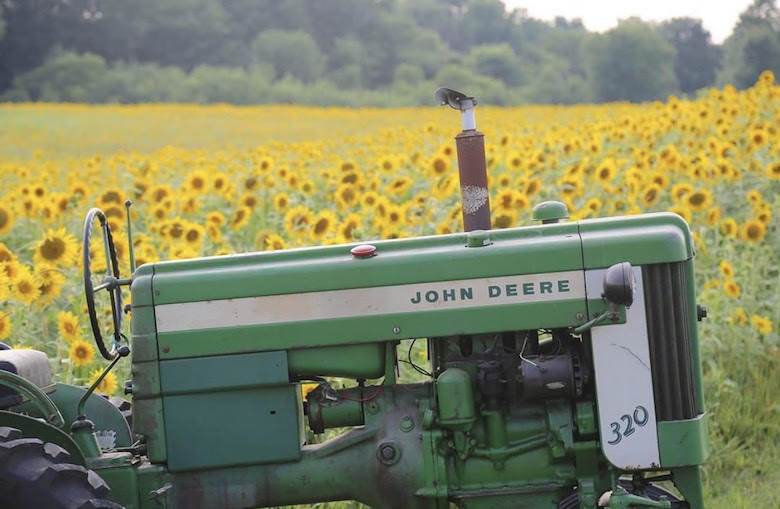Machinery companies explore their role in denim's sustainability

A session centred on the machinery side of denim production during the recent hybrid Sustainability Talks Istanbul conference marked the first time such a panel had been assembled in the history of the denim industry, remarked one of the talk’s moderators, Kingpins Show and Transformers Foundation founder, Andrew Olah.
Mr Olah co-moderated the discussion alongside Kingpins’ technology leader and Transformers Foundation director, Miguel Sanchez.
Participants included denim technologist at Karl Mayer, Giambattista Verdone; Säntis owner, Stefan Hutter; marketing and communications manager at Itema, Valentina Brignoli; area sales manager at Laroche, Francis Elias Junker; global cotton production systems manager at John Deere, Steve Young; and Tonello sales director, Maurizio Morosini.
Of particular note were Mr Young’s comments about Moline, Illinois-headquartered machinery maker John Deere’s latest eco-minded technological developments. Following the company’s acquisition of Californian startup Blue River Technology for $305 million in 2017, John Deere has harnessed its advanced technology to teach its own agricultural sprayers (already wirelessly connected to the business’ central operations hub) to identify weeds versus crops in the field using machine learning.
From a sustainability angle, this effectively means that the machinery will know to only spray herbicide and other chemistry on weeds, for example, as opposed to crops such as cotton. In addition to producing a ‘cleaner’ crop, this can also help farmers with cost reduction.
When pressed by Mr Olah, Mr Young emphasised that, generally, cotton farmers are “naturally” focused on sustainability (as they want to look after their land), but he also said that he doubted that the wider industry “sees that very well”.
The John Deere systems manager further revealed how his company is currently working to develop an easier way for its US-based farmers to sign up to and document their practices for the US Cotton Trust Protocol using its machinery, which he described as a “sometimes arduous” task at present. On John Deere’s existing traceability efforts, Mr Young pointed to its cotton harvesters’ built-in radio frequency identification (RFID) tags, which link picked cotton back to the company’s operations centre.
On the wider issue of the visibility of machinery enterprises’ sustainability practices beyond their immediate customers (such as Turkish denim producer Kipas, the event’s sponsor, in Itema’s case), the other panellists’ responses were varied.
Mr Hutter, on behalf of Säntis, perceived the visibility of its flagship RCO100 product (a 100% recycled cotton), to be strong, given the company’s frequent communication with its partner PVH, for example. (When working with PVH brand Tommy Hilfiger on denim, Mr Hutter said that the recycled cotton Säntis supplied was made up of 70% pre-consumer recycled cotton and 30% post-consumer recycled cotton, with this ingredient largely drawn from post-consumer denim.)
Meanwhile, Mr Morosini and Mr Verdone spotlighted the potential for greenwashing or “only storytelling” if brands do not possess first-hand knowledge of textile machinery and the sector’s ecological capacity. Mr Junker said that Laroche was not itself in direct contact with brands.
On the other hand, Ms Brignoli drew attention to the fact that Itema had previously launched products at Kingpins in collaboration with Kipas, in effect providing an example of how machinery manufacturers could forge tighter ties with the wider denim industry. (When discussing the separate issue of old looms with Mr Olah, Ms Brignoli underscored how, to her knowledge, newer weaving machinery is more energy efficient and, therefore, more competitive.)
Closing the discussion with a question on sustainability targets, the panel reflected on industry-wide issues and the steps their respective companies are taking to progress their commitments.
Highlights included Mr Morosini’s candid response that the industry must realise “at least 10%” of its existing promises, particularly when it comes to transparency. The Tonello spokesperson stated that not only was sustainability “the future", but "it can and should happen now”.
Mr Verdone added that he hoped Karl Mayer’s Greendye indigo dyeing machine would be used to produce more commercial denim collections at scale, as it has the capacity to do so, whereas Ms Brignoli suggested that the weaving segment had “reached [its] production speed”. For his part, Mr Junker revealed that Laroche’s aim is to support the integration of as much post-consumer regenerated fibre into yarns as possible, all the while optimising the energy efficiency of its machinery.
Excitingly, Säntis’ Mr Hutter disclosed that the company is presently working to patent a process for extracting elastane (spandex) from denim blends. He emphasised that this is currently a “big obstacle” in denim recycling and that its technology would be used first in partnership with Kipas.
Image: John Deere via Instagram. Credit: Alex C.










